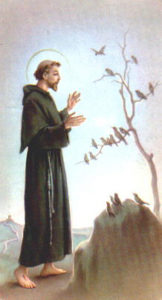
Francis was the son of Pietro Bernadone, a rich cloth merchant. Though he had a good education and became part of his father’s business, he also had a somewhat mispent youth. Captured during a conflict between Assisi and Perugia, he spent over a year as a prisoner of war. During this time he had a conversion experience, including a reported message from Christ calling him to leave this worldly life. Upon release, Francis began taking his religion seriously.
Francis took the Gospels as the rule of his life, Jesus Christ as his literal example. He dressed in rough clothes, begged for his sustenance, and preached purity and peace. His family disapproved, and his father disinherited him; Francis formally renounced his wealth and inheritance. He visited hospitals, served the sick, preached in the streets, and took all men and women as siblings. He began to attract followers in 1209, and founded the Franciscans based on a simple statment by Jesus: “Leave all and follow me.” In 1212, Clare of Assisi became his spiritual student, which led to the founding of the Poor Clares. He visited and preached to the Saracens; composed songs and hymns to God and nature; lived with animals, worked with his hands, cared for lepers, cleaned churches, and sent food to thieves. In 1221 he resigned direction of the Franciscans.
While in meditation on Mount Alvernia in the Apennines in September 1224, Francis received the stigmata, which periodically bled during the remaining two years of his life. This miracle has a separate memorial on 17 September.
| Born 1181 at Assisi, Umbria, Italy as Francis Bernardone |
Died 4 October 1226 at Portiuncula, Italy of natural causes; relics in Assisi, Italy |
| Canonized 16 July 1228 by Pope Gregory IX |
Name Meaning bright; brilliant |
| Patronage against dying alone; against fire; animal welfare societies; animals; ecology; environment; families; fire |
|
| Representation birds; deer; fish; lamb; skull; stigmata; wolf |
|

